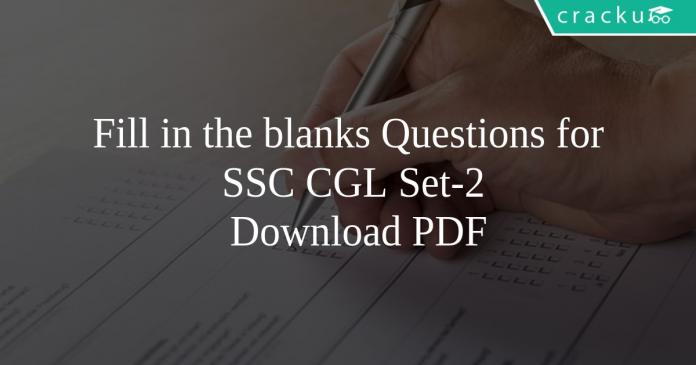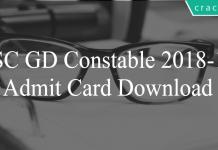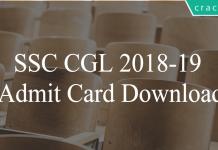Fill in the blanks Questions for SSC CGL Set-2 PDF
Download SSC CGL Fill in the blanks questions with answers set-2 PDF based on previous papers very useful for SSC CGL exams. Very important questions for SSC exams.
Download Fill in the blanks Questions for SSC CGL Set-2 PDF
Get 790+ mocks for Rs. 100 – Coupon GOVTJOB
InstructionsDirections :Sentences are given with blanks to be filled in with an appropriate word(s). Four alternatives are suggested for each question. Choose the correct alternative out of the four.
Question 1: The hotel was not too expensive
a) was it ?
b) wasn’t it?
c) is it ?
d) isn’t it ?
Question 2: Like humans, zoo animals must have a dentist to __ their teeth
a) fill
b) filled
c) filling
d) to be filled
Question 3: It was very kind of you to do the washing-up, but you _ it.
a) didn’t have to do
b) hadn’t to do
c) mightn’t have done
d) mustn’t have done
Question 4: He went __ sea alone.
a) in
b) to
c) into
d) on
Question 5: The __ of our civilization from an agricultural society to today’s complex industrial world was accompanied by war.
a) adjustment
b) migration
c) route
d) metamorphosis
SSC CGL Previous Papers Download PDF
InstructionsDirections:In thefollowing questions sentences are given with blanks to be filled in with an appropriate word(s). Four alternatives are suggested for each question. Choose the correct alternative out of the four.
Question 6: The court _____ cognisance of the criminal’s words.
a) took
b) made
c) gave
d) allowed
Question 7: _____ wins this civil war there will be little rejoicing at the victory.
a) Whichever
b) Whoever
c) Whatever
d) Wherever
Question 8: As he got older his belief in these principles did not_____.
a) wither
b) shake
c) waver
d) dither
Question 9: Everyone in this world is accountable to God___ his actions.
a) about
b) for
c) to
d) over
Question 10: Your father used to be the principal of this college,
a) did he ?
b) does he ?
c) didn’t he?
d) doesn’t he ?
18000+ Questions – Free SSC Study Material
Answers & Solutions:
1) Answer (A)
The correct answer is option A.
Question tag -It is used when one wants to reconfirm ones statement.It is a statement followed by a question.
If the statement is positive, question tag will be negative and vice versa.
For ex- Shyam is working in a bank, isn’t he?
Question tags are formed with the auxiliary or modal verb from the statement and the appropriate subject.
A subject pronoun comes after an auxiliary or after `to be’ form of the verb & is used to replace the noun.
Here in the given question-
Hotel was not too expensive, wasn’t it?
Since the statement /main part of the sentence is in positive form, question tag will be negative.
Here `was’ is used in main part of the sentence,so in question tag we use `wasn’t’.
(Same verb/(auxiliary,modal,main)as that of the sentence)
To indicate `Hotel’,here we used pronoun`it’.
..
2) Answer (A)
The correct answer is option number 1st.
To +V1 is called as the infinitive form if the verb.
After `to’ we use first form if the verb.
Infinitive form if the verb is used when we want to express the purpose,to answer why.
Ex-He studied hard to make his parents proud.
Why he do study -to make his parents proud.
Infinitive form is used as a subject of verb,as a object of verb,as the complement of the verb,as a object of preposition,to qualify noun,to qualify a sentence.
Here it is used as a `Adverb’.It qualifies verb `Studied’.
In the given example, options -`to be filled,filling,filled’are wrong.Because after `to’ we can’t use 3rd form of the verb,rest options are grammatically incorrect.
3) Answer (D)
The correct answer is option number -D
Mustn’t have done is the correct answer.
Mustn’t have -Must is a modal verb,it adds meaning to another verb.
Mustn’t we use to show possibility or necessity.
Must not -We use to talk about things we need to avoid doing or while telling someone to not do it.
Rest options are grammatically & contextual incorrect.
Hadn’t to do -Had we use to indicate past things.Also hadn’t to do is grammatically incorrect.
Might -We use might to show prediction, possibility, probability.
Ex- the Prime Minister might visit the town.
Here indicating possibility.
Might & hadn’t is inappropriate because sentence is in the present tense.
Usage of didn’t is not contextually correct.
Didn’t have to do -We say didn’t have to represent specific point of time that has already passed.
Only option `Mustn’t have do’ is grammatically & contextually correct.
4) Answer (B)
The correct answer is option B.
Here it’s prepositional error.
Preposition `TO‘ is used to show destination.
Also `go to sea ‘ is an idiom which means to become a seller,to embark on a voyage.
We see uses of other preposition
Into– we use this to show moment,any action which show moment.
Ex- He jumped into the well.
In -It is use to show place,time.
Ex- There is a pen in the cupboard.
On -it is use to indicate time,place.(When things are in direct contact,at surface area,in rest position)
Ex- there is a book on the table.
5) Answer (D)
The correct answer is option number D.
The sentence implies here the transformation /changes in civilization (human society) from agriculture to today’s industrial world was accompanied by war.
Meaning of remaining options.
Adjustment (noun)-
a small change, corrections, modification.
Ex -The stock market exchange made an adjustment in their policy to get more investors.
Route (Noun)
A way ,road,path, approach,method.
Ex- The route to Theni from Madurai is 70kms.
Migration (Noun)
An instance of moving to live in another place for a while.Movement, journey.
Ex- Migration of outsiders to Delhi make the city over- populated.
6) Answer (A)
Option A is the correct answer.
Cognisance or cognizance Means Notice, awareness or knowledge.
Here in this sentence ,the court notices the words of the criminal. That they are considering the words from the Criminal. So gave, allowed and made doesn’t fit in the blank of the sentence.
7) Answer (B)
The correct answer is option -B
Whoever- It is a subject pronoun & work like the pronouns I,We He,She & They.
Ex- Whoever wins this debut will win a prize.
Whoever means -Someone/anyone who does a particular thing or is in a particular situation.
Meaning of the remaining options
1) Whatever- Unexceptional /unimportant,at all, absolutely, whatsoever.No matter which,for any, anything that.
Synonyms- So what.
Ex- Whatever may happen,I will go to Mahabaleshwar today.
2) Wherever-(Adverb) An emphatic form of where.
It also acts as a conjunction -whatever place, anywhere,in all places, everywhere.
Ex- I will come with you wherever you will take me.
3) Whichever- (Adjective / pronoun) – Any one/ a no of a group.
Ex- Whichever pizza you ordered for her, it must have had some very delicious ingredients.
8) Answer (C)
The correct answer is option number – C.
Waver means – To sway back & forth, to fluctuate /vary,to tremble,to flatter,to be indecisive.
Dither- To tremble,the state of being undecided.
Wither-To go against,resist,oppose.
Shake -to cause something to move rapidly in opposite directions,to disturb emotionally,to lose,evade,get rid of
Here sentence implies that -As he got older, beliefs in principles became more strong,he didn’t fluctuate.
Remaining options are contextually incorrect.
9) Answer (B)
The correct answer is -B
The correct preposition is `for’.
The given sentence seems to imply that everyone is responsible to God for his actions.
Accountable for -means responsible for.
Meaning of other options
1)about-Near,not far from,on the point of verge of,concerned with,regard to,on account of,on the subject of.We can use `About’ in above context.It can refer to movement /position in various directions/places
2) to – It is used to indicate directions.To denote any thing which is at surface area, in rest position.
3) over- it is used to indicate place.
So these are contextually incorrect.
Also the expression `Accountable for’ means to responsible for.So,usage of `For’ will be correct here.
10) Answer (C)
The correct answer is option -C
The given sentence is of question tag.
Question tag is used to reconfirm the question or the statement.
If the main sentence is positive, question tag will be negative and vice -versa.
Here the given sentence is positive,so question tag will be negative.
The sentence is in the past form.`Used to’ we use as a simple present tense but to indicate the things happened in the past.
Ex-I used to go by bus.
As the sentence is in the past form,usage of `did’ will be correct.
`Did’ is the past form of the `Do’
Option A- Did he ? Will be wrong.Because given sentence is in the positive form,so question tag will be negative.
Option B- Does he?- Will be wrong.Because the given sentence is in the past tense & `Does’ is use for 3rd person singular & when sentence is in present form.
Option D- Doesn’t he? – Will be wrong.Because the given sentence is in present tense.Though the question tag is negative,it is wrong.Because `Does’ is used when the sentence is in the present tense & subject is 3rd person singular.
We hope this Fill in the blanks Questions for SSC CGL Exam preparation is so helpful to you.





